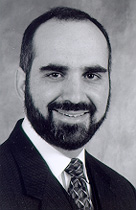Instead of multiple pills each day, patients would receive one weekly injection
A University of Nebraska Medical Center research team is making strides in developing weekly injectable antiretroviral therapy (ART) for patients with human immunodeficiency virus (HIV) infection. This is a potential alternative for the daily regimen of pills that patients are now taking.
The research is being funded as a three-year, $4.6 million pilot grant from the National Institute on Drug Abuse at the National Institutes of Health.
Howard Gendelman, M.D., professor and chairman of the department of pharmacology and experimental neuroscience at the University of Nebraska Medical Center, is the lead investigator.
In the first year, the research team – made up of two UNMC colleges, four departments, and two universities – has been successful in developing a lead drug formulation in rodents. Testing is now underway in larger animals. Human use will require Food and Drug Administration (FDA) approval.
Dr. Gendelman said the long-acting ART is a substantive breakthrough for HIV patients.
“Having a single injection for treatment would facilitate compliance of complex dosing regimens and be quite beneficial to patients who cannot take the drugs orally,” Dr. Gendelman said.
“Compliance is the key to maintaining control of HIV growth. It’s absolutely critical that patients take their medications. This is especially important in a resource-limited setting such as Africa, where access to drugs is more limited.”
Suboptimal adherence increases the risk of treatment failure and viral resistance. Importantly, drug abuse is highly correlated with only sporadic adherence to oral dosing and commonly leads to accelerated HIV disease progression.
In many cases, health care providers are reluctant to prescribe ART to patients who are addicted to drugs because of concerns about the promotion of virus resistance.
The work group included nanoformulation experts, cell biologists, virologists, pharmacologists, pharmacists and clinicians.
A progress report will be presented to a team of advisors which is visiting UNMC this week. These advisors include representatives from the FDA and leading medical universities and pharmaceutical companies including Purdue University, Johns Hopkins University, University of Pittsburgh, and Baxter Health Care.
Through world-class research and patient care, UNMC generates breakthroughs that make life better for people throughout Nebraska and beyond. Its education programs train more health professionals than any other institution in the state. Learn more at unmc.edu.
